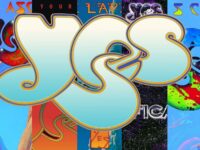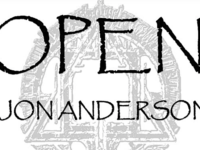In the past, introducing a new voice into the ever-changing Yes dynamic has had one of two effects.
It either started the band on a series of quickly realized new directions (as with earlier additions of Steve Howe on 1970’s The Yes Album, Rick Wakeman for 1971’s Fragile and Trevor Rabin on 1983’s 90125) or utterly confused long-time fans. (Think the arrival of Patrick Moraz on 1974’s Relayer; Geoff Downes and Trevor Horn with 1980’s Drama; or Jon Davison on 2014’s Heaven and Earth.)
Time, however, hasn’t been as kind to Open Your Eyes as it has to, say, Drama, which has its stalwart defenders these days. (Including, ahem, us.) Yes’ initial studio project with Chris Squire’s protege Billy Sherwood as a full-time member was largely ignored in its time – only reaching No. 151 in America, and failing to chart at all in the UK – and remains so decades later.
Still, a return to one of Yes’ most notable late-career orphans reveals a project that connects Rabin’s heavily produced hitmaking era with the quirk-filled, Britpop-flavored sounds of Yes’ self-titled 1969 debut (casually referenced, it seems, on the Open Your Eyes cover design, as well) and 1970’s Time and a Word. There still are, to be sure, a few moments when the record betrays its troubled genesis. Yet to my ears Open Your Eyes stands on its own within this intriguingly connective context.
For instance, “New State of Mind,” though a touch overlong, manages to combine a layered, Beatle-esque vocal treatment and some nifty sitar textures with a shuddering Zeppelin-ish rhythmic signature. If you felt that went too far afield, there are creature comforts to be found in the subsequent title track – with its familiar episodic song structure, driving Steve Howe riff and old-school intertwining of voices from Jon Anderson, Squire and Sherwood. Howe and Sherwood then smartly tangle back and forth on acoustics through the opening of “Universal Garden,” to great effect.
So far, so good, right? Unfortunately, from there Open Your Eyes suffers through a more uneven journey – something that, in many ways, is to be expected.
Similar to 90125, this album arrived on Nov. 24, 1997 from the ashes of a side project involving Yes members, as Squire, drummer Alan White and Sherwood (a band songwriter, touring musician and then producer dating back to 1991’s Union) worked on material intended for what would later become a separate self-titled album called Conspiracy. In both instances, Anderson became enchanted with some of the early sessions work and the songs eventually evolved into a new Yes album.
The difference is, Rabin had been working on the backbone of songs that would make up 90125 (notably the eventual chart-topping single “Owner of a Lonely Heart”) for years. Sherwood and Squire had only just begun their collaborations when Yes’ newly acquired label began clamoring for a studio album to build a tour around.
Open Your Eyes would ultimately become something of a cobbled-together rush job: “Somehow, Someday” is built off portions of the song “Boundaries” from Anderson’s 1982 solo project Animation and the bass line from “City of Love” on 90125. “No Way We Can Lose” sounds like a reworking of Rabin’s “Saving My Heart” from Union. “Man in the Moon” is a Conspiracy tune, with Anderson and Howe’s parts tacked on.
In fact, an uncomfortable amount of Howe’s work feels second hand. He and Anderson were only intimately involved from conception on a single song, “From the Balcony.”
Even so, “Balcony” is a deeply effective duo recording. Debating what Open Your Eyes isn’t seems to have inured many to its remaining charms. Of course, Open Your Eyes isn’t Yes’ most complete album, but that’s letting perfect become the enemy of good.
Get past the somewhat out-of-place reggae affectations of “No Way We Can Lose,” and you’re left with a series of boldly inspiring vocal passages. The intriguing “Wonderlove” is simultaneously cosmic-cool and chest-splashingly propulsive, with Howe taking a stunning Robert Fripp-inspired turn. “The Solution,” a wildly underrated rocker, boasts the kind of coiled sense of rhythmic anticipation from the dearly departed Alan White (not to mention a serrated outburst from Howe) largely unheard since Drama.
Then there’s the lengthy concluding ambient track. Punctuated by sweeping vocal interludes from the album’s key moments, it always felt like a nod to 1972’s Close to the Edge – and another honorable attempt to bring things full circle after a lengthy period of change within the band. Maybe Yes didn’t complete that mission. Still, it’s time to open your ears to what went right on Open Your Eyes.
- The Bright Spots in George Harrison’s Troubled ‘Dark Horse’ Era - December 29, 2024
- The Pink Floyd Deep Cut That Perfectly Encapsulates ‘The Wall’ - November 29, 2024
- Why Pink Floyd’s ‘The Endless River’ Provided a Perfect Ending - November 11, 2024




I own both Conspiracy and Open Your Eyes and realize most of Open Your Eyes was cut in whole cloth from Conspiracy. I owned Open Your Eyes first and always thought many of Howe’s licks sounded as if they were late tack- ons, verified when I purchased Conspiracy much later.
I also purchased the 5.1 mix of Open Your Eyes when it became available, although I could not make it work 5.1 until I purchased a 5.1 DVD player.
The only difference between the 5.1 and the stereo is that the ambient ending is not included but once I heard it 5.1 it blew me away. It was as if I was right there in the studio, as it is with all of the remastered Yes 5.1 discs.